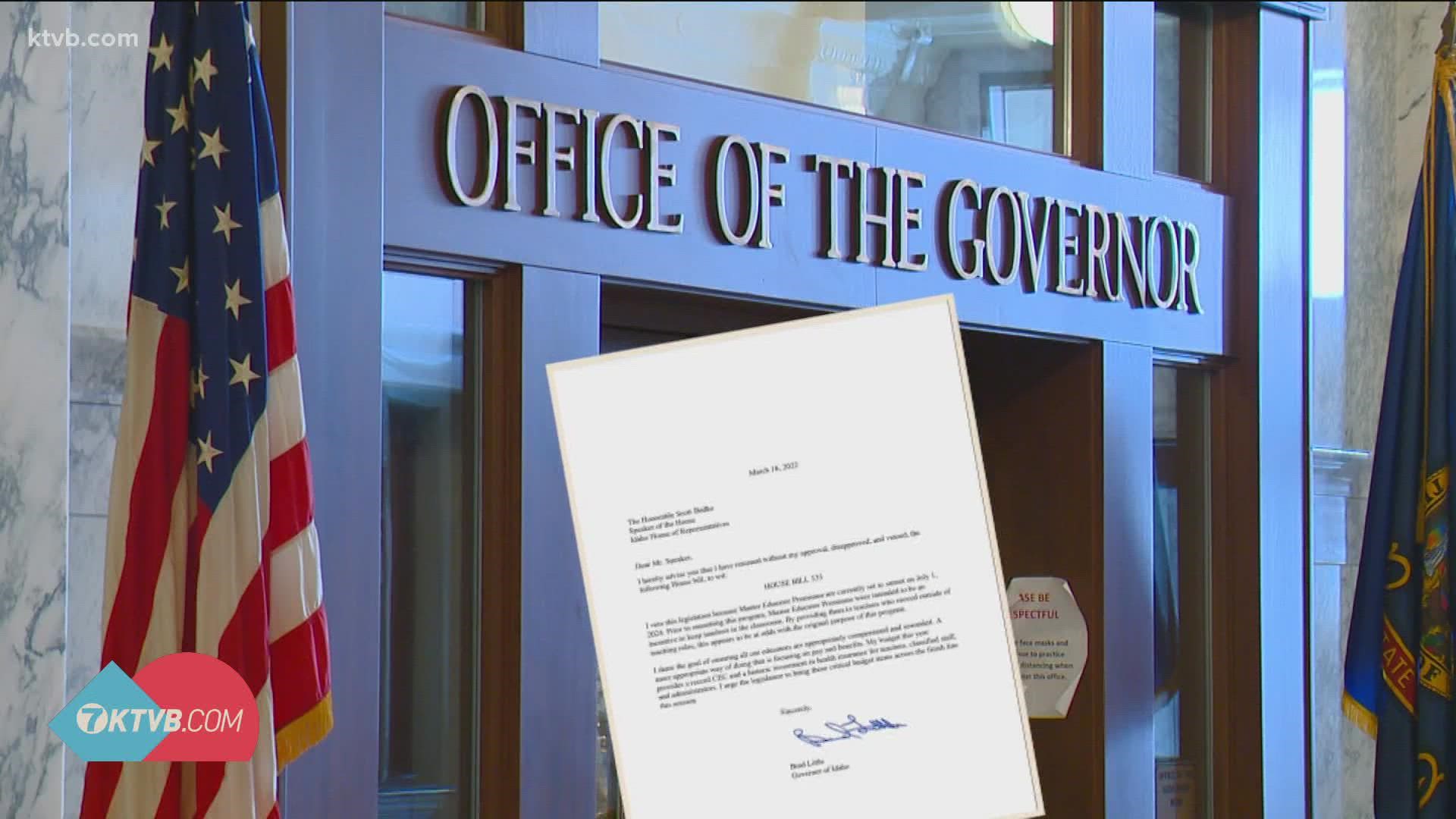BOISE, Idaho — The first veto of the year is in the books for Idaho Gov. Brad Little.
"He actually gave me the courtesy of calling in and telling me yesterday that he was going to have a problem with the bill and why he was going to veto the bill,” said Rep. Lance Clow, (R-Twin Falls), the bill sponsor.
Rep. Clow said his legislation is designed to get teacher incentive payments to administrators that recently transitioned from their roles as teachers. That incentive money is part of the career ladder, a program called the Master Educator Premiums.
"It was personal because I knew a couple of the teachers. I knew one specifically that came to my attention and brought it to my attention about what I described as more inequity in the way funding formulas work or how our compensation programs work,” Clow said.
The Master Educator Premiums were designed a few years back to reward Idaho teachers who showed the highest levels of mastery in instructional techniques and impactful work in the classroom. Premiums were set for $4,000 a year for three years per teacher. To qualify, teachers needed to build portfolios to exhibit their work. The program FAQ fully acknowledges that creating that portfolio would take 20-40 hours per year for three years. Teachers who went down that path but later got promotions into administrative roles lost eligibility, despite the dozens and dozens of hours working towards the program.
"They're still helping in the classrooms and many as assistant principals, and I suppose they end up being substitutes when there's a shortage there in the classrooms. They're helping all the time. They're working with kids. And I felt that so awfully close to the same idea when a teacher was,” Clow said.
In his veto letter Governor Little writes, "Master Educator Premiums were intended to be an incentive to keep teachers in the classroom. By providing them to teachers who moved outside of teaching roles, this appears to be at odds with the original purpose of this program."
The Governor adds, "I share the goal of ensuring all our educators are appropriately compensated and rewarded. A more appropriate way of doing that is focusing on pay and benefits."
Little goes on to encourage lawmakers to pass education budgets he suggested in his State of the State.
Stakeholders weighed in, too, including Layne McInelly, President of the Idaho Education Association. He writes in a statement to KTVB: "Any opportunity to reward educators for their essential work, which this bill did, is always a step in the right direction. However, our members also wholeheartedly agree with the governor's reasoning in vetoing this legislation: Focusing on pay and benefits is the best way to ensure Idaho's educators are properly compensated for their importance to our students, families, state and society."
"I understood his argument. I just thought mine was a better one," Clow said. "It is our taxpayers money. And so, I'm looking at it as an equity fairness thing, and the governor is looking at it to be fiscally responsible, and I don't know which one of us is right. We both think we are."
Clow said he brought the legislation to reward educators who put in a lot of time to be a part of the program.
"I've told teachers that retired and left and whatever, you don't qualify anymore. We're paying money to help kids. At least there's assistant principals and vice principal and principals. They're still helping the kids, and their skills and talents are still valued to the state," Clow said.
The legislation passed the Idaho House 52-15 with three absent. It passed the Senate by a vote of 32-3. Those numbers could be good news on a possible veto override vote, which would need two-thirds support in both chambers. Rep. Clow said it's wait and see; veto overrides can be rare.
"Sometimes people are a little reluctant to override a veto even if they voted for the legislation in the first go-round,” Clow said.
Join 'The 208' conversation:
- Text us at (208) 321-5614
- E-mail us at the208@ktvb.com
- Join our The 208 Facebook group: https://www.facebook.com/groups/the208KTVB/
- Follow us on Twitter: @the208KTVB or tweet #the208 and #SoIdaho
- Follow us on Instagram: @the208KTVB
- Bookmark our landing page: /the-208
- Still reading this list? We're on YouTube, too:

